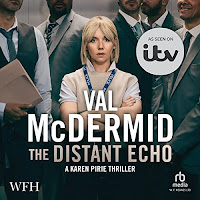How brilliant, for example, to note Angela Thirkell's "blithe lack of sexual awareness" by quoting from a scene in The Brandons (1939) in which characters at a village fete take a ride on a merry-go-round made of wooden animals:
"'I knew it was you on the ostrich,' she [Lydia] said to Delia ... 'I say, someone's on my cock.'
'It's only my cousin Hilary,' said Delia. 'He won't mind changing, will you, Hilary...'
Mr Grant, really quite glad of an excuse to dismount, offered his cock to Lydia, who immediately flung a leg over it, explaining that she had put on a frock with pleats on purpose, as she always felt sick if she rode sideways...
... 'I know that once Lydia is on her cock nothing will get her off. I came here last year ... and she had thirteen rides." (Lee, p. 180, quoting Thirkell pp. 260-2)
This is all the more extraordinary when Lee then tells us that Thirkell was the mother of Colin Macinnes, author of Absolute Beginners (1959) and other bold works exploring sexuality and decadence. As a result, the quoted passage becomes something else, indicative of the clash between mother and son.
Lee quotes juicy bits from a number of other biographies, and like her I'm drawn to what she calls the "brutal, funny and helpful" advice given by the writer Colette to actress Marguerite Moreno:
"You lose most of your expressiveness when you write... Stick in a description of the decor, the guests, even the food... And try, oh my darling, to conceal from us that it bores the shit out of you to write." (Lee, p. 117, quoting Judith Thurman's Secrets of the Flesh - A life of Collete (1999), p. 543)
Or there's the way she explains the shock that met Ellen Glasgow in the 1930s writing stories about degeneration, extramarital love and scientific arguments against religion etc, then quotes one of Glasgow's characters - "failed philosopher, John Fincastle" - to get a sense of the impact on the author's own career.
"Nobody could earn a livelihood in America by thinking the wrong thoughts." (Lee, p. 124, quoting Glasgow's Vein of Iron (1935), p. 38)
Body Parts is peppered with this stuff. Even the briefest reference to Jane Porter's 1803 novel Thaddeus of Warsaw (p. 125) ignited my interest, prompting additional reading and connections - and perhaps a new project to lose myself in...
But what about things I'm writing now? Two essays in this collection, "Virginia Woolf's nose" at the start and "How to End It All" at the conclusion, address the ways that accounts of a person's death are often written to cast light or reflection on the life as a whole. Imagining the subject looking back over their lives is a a conceit, imposing neatness on what can be untidy ends. In fact it's not just death: lives are often untidy and inconsistent, and Lee is good on exploring that - how to address contradictory or outlier evidence, or the way a theory about someone's life can be repeated by biographers until it takes on the authority of "fact". Lee says,
"this process of cumulative reiteration happens all the time" (p. 135)
I'm mindful of that as I write my biography of David Whitaker - and also my book on his 1964 Doctor Who story, The Edge of Destruction, where I can see such reiteration in the "facts" about early Doctor Who. I'm not sure Lee provides answers to the knotty questions that she raises about how we go about telling a story without fictionalising real life - but I think that's the point. There is plenty to think about; she directs us towards the things to worry at.






